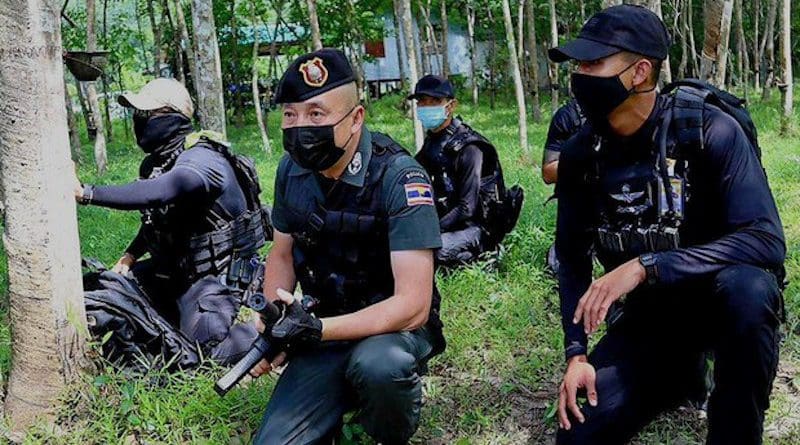Thailand: Deep South NGOs Urge Use Of Proportional Force In Pursuing Suspects
By BenarNews
By Mariyam Ahmad
Thai human rights groups urged the government to use proportional force when trying to arrest alleged insurgents in the Deep South, after military and police personnel surrounded and gunned down two suspects during a long standoff this week.
As many as 100 police and servicemen were deployed to catch seven suspected insurgents during a raid in Pattani province on Monday, said Pornpen Kongkachonkiet, director of the Cross-Cultural Foundation. The overwhelming numbers of troops deployed made the suspects fight back, resulting in the deaths of two of them, she said.
“They had no intention to fight but the raid put them in a corner. To pursue suspects, persons who jumped bail, or fugitives, violent means should be the last resort,” Pornpen told BenarNews.
“In an endeavor to end Deep South violence, we urge the government to abide by human rights laws, the criminal code, human rights principles and proportionality in the rules of engagement.”
Since June 21, officials said that the combined forces of the military, police and back-up units shot and killed four insurgents in separate raids in Pattani province, including the one on Monday.
Before dawn on Monday, security forces pursued some seven suspected insurgents who had traveled to Chamao Samton village in Sai Buri district, officials said.
Two of the suspects besieged the Ma’had Subulussalam Islamic Private School before they were gunned down after a standoff that lasted 17 hours. Three soldiers were injured in the operation. The rest of the suspects fled.
A day later, in what police said was a retaliatory incident, a soldier was killed and three others injured in a land-mine explosion in Chana, a district of nearby Songkhla province.
Pornpen and another Pattani-based NGO, Duayjai Group, said that taking the suspects alive and trying them in court would help avoid suspicion among the residents of the Malay-speaking Muslim-dominant southern border provinces, which for decades have been the flash point of armed conflict between government troops and separatist rebel groups.
“By bringing them to justice, that would instead create confidence in the government’s governance,” Pornpen said.
‘Never force them to fight back’
Meanwhile, the military in the Deep South said that security forces usually negotiate with the suspects and ask them to surrender. Servicemen involve local and religious leaders as well as suspects’ relatives in the negotiations, said Col. Kiatisak Neewong, spokesman for ISOC-4, the military’s regional command.
“We always leave room for them to surrender, never force them to fight back,” Kiatisak told BenarNews.
“We negotiate with them every time but they did not yield, shot at officials and even a dog.”
In Sai Buri on Monday, suspects fired at officials who then had to defend themselves, Kiatisak said.
“Like when they opened fire or hurled a grenade to injure officials in Sai Buri, we have to defend ourselves,” he said.
He also denied that they had deployed as many as 100 troops to pursue suspects in the Monday incident.
“We don’t use 100, only 20 members are in tactical teams. The rest are support teams like food supplies, scout, drone operators – no weapons used,” Kiatisak said.
A Buddhist group leader in Yala, another province in the Deep South, said it was hard to define a fair operation when officials have to arrest suspects.
“The question as to how officials can conduct a ‘humanitarian-compliant’ search or raid is hard to answer,” said Rukchart Suwan, president of the Buddhist Network for Peace.
“It may be way too much to use 50, 60 or 100 men per two suspects in hiding, but it depends on their tactics – they use a combined force of soldiers, police and civil servants.”
Since the decades-old insurgency reignited in January 2004, more than 7,000 people have been killed in the region, according to Deep South Watch, a Pattani think-tank.
Face-to-face peace talks between Thailand and Barisan Revolusi Nasional (the National Revolutionary Front, or BRN), which is the largest of the armed insurgent groups in the far south, have been stalled since March last year because of the COVID-19 pandemic. But both sides said they continued to meet online at technical-level panels, with Malaysia serving as facilitator.
The last virtual meeting was held in February, Abdul Rahim Noor, the Malaysian broker of the southern Thai peace talks, confirmed to BenarNews at the time.

